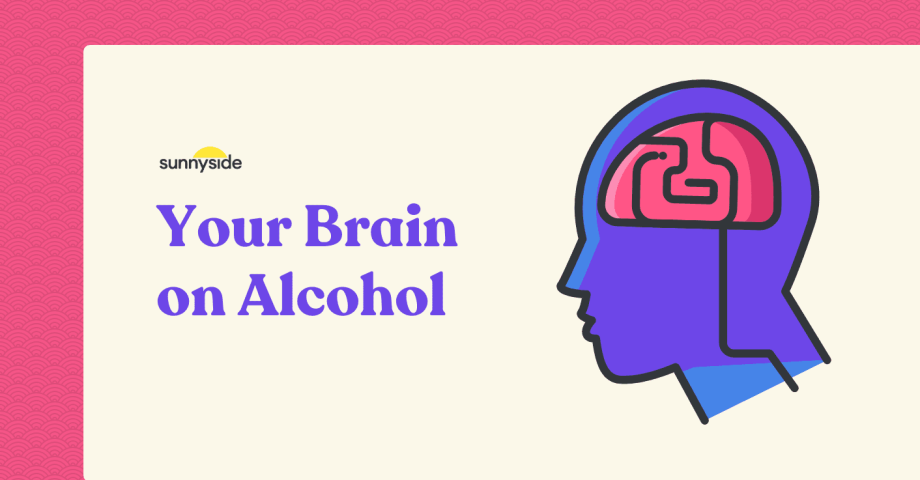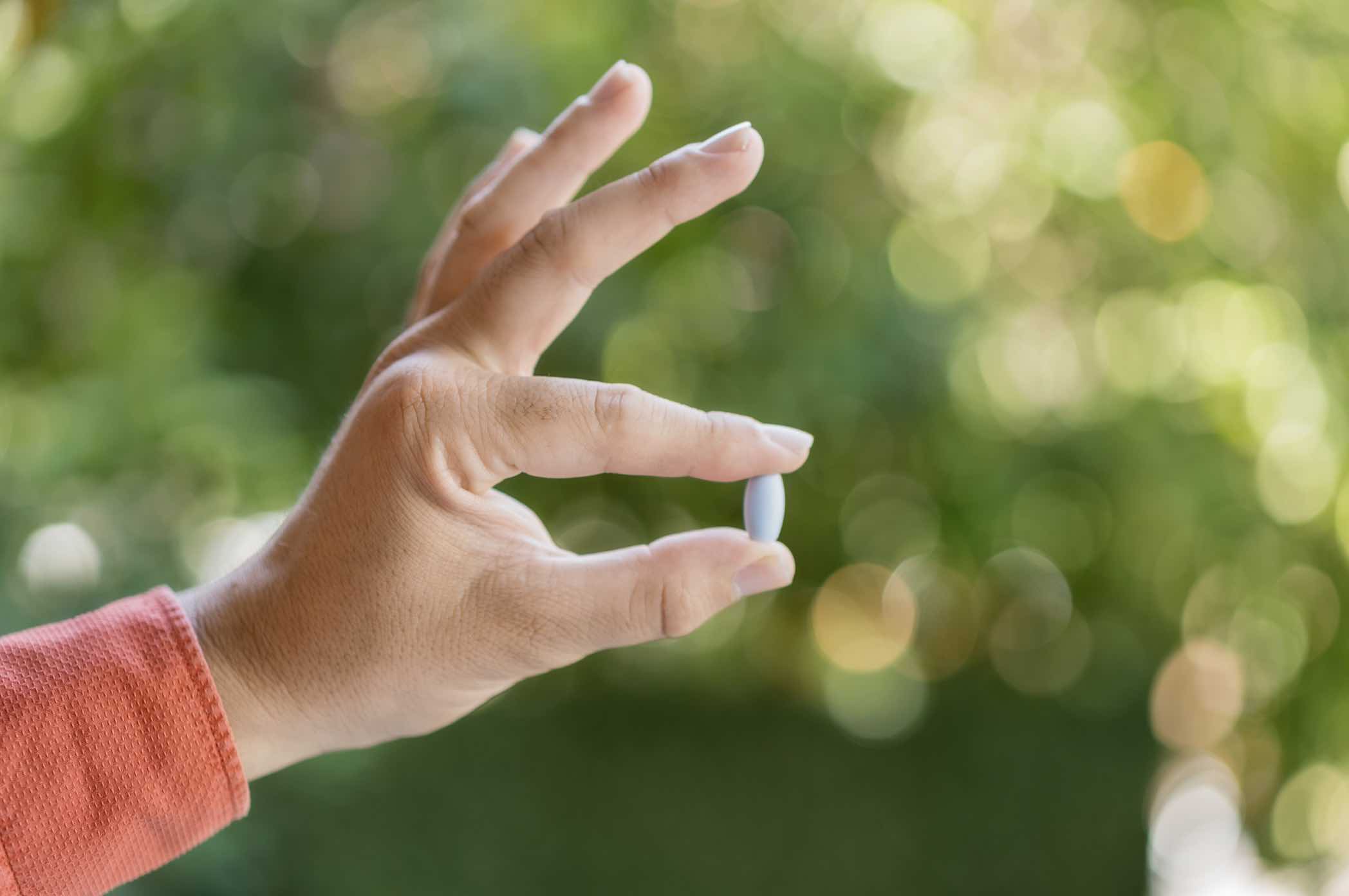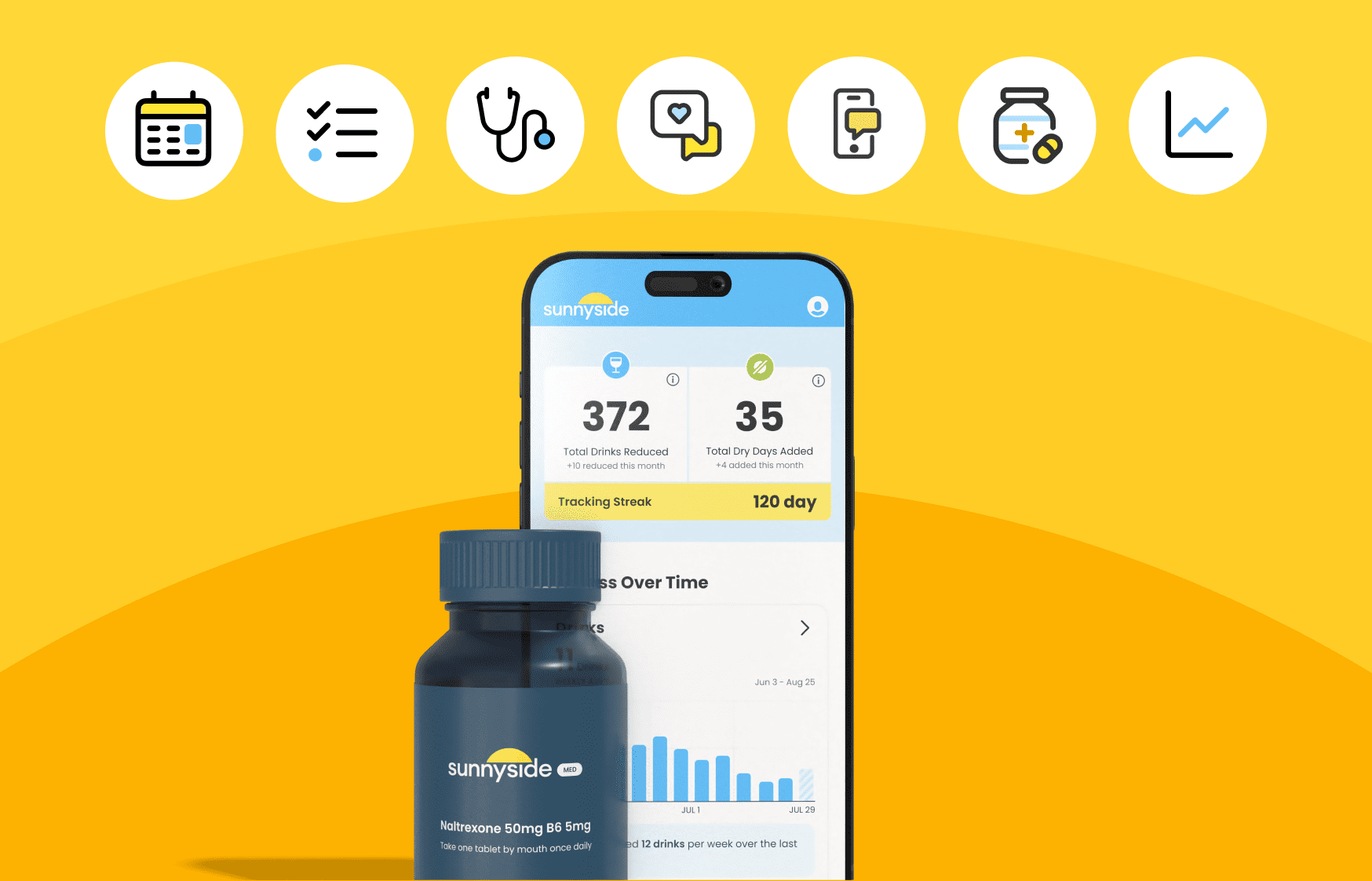Last Updated on May 25, 2023
You want to go to the gym more, eat less junk food, and try to cut back on the evening wine, but something keeps stopping you.
What keeps getting in the way? Why is it so ridiculously hard to change old habits and live healthier?
Turns out, you can (partially) blame dopamine.
Our brains are wired to want a reward – and that wave of euphoria you feel when you take that first bite of your brownie or sip of wine is dopamine surging through you.
Alcohol feels great in part because it increases dopamine short term, but your brain actually adapts and eventually the small feeling of reward that comes from drinking can dissipate. Over time, dopamine production decreases once your tolerance goes up, meaning you may need more alcohol to feel the same boost over time.
Read on to find out how exactly alcohol changes your dopamine levels, and what you can do to focus on healthier rewards and ultimately become more mindful of your drinking.
Dopamine: The Feel-Good Chemical
Dopamine is a neurotransmitter that works with the reward center of your brain, making you feel pleased, satisfied, and motivated. Whenever you get that rush of pride after accomplishing something, dopamine is probably surging in your brain. In fact, it’s there after you do anything that makes you feel rewarded, like earning money, eating good food, or having sex.
This feel-good chemical does a lot more than just make you feel rewarded. The amount you produce affects how you think, work, and even sleep.
Here’s where your dopamine levels have the biggest impact:
- Memory
- Learning
- Attention
- Pleasure
- Motivation
- Movement
- General mood
- Sleep
Basically, dopamine is involved in almost every area of your thought and reward system. So the healthier your brain is, the better it can use dopamine effectively and communicate messages between nerve cells and the rest of your body. That means you can go after your goals much more easily, without losing motivation.
Dopamine’s Dual Effect: Neurotransmitter and Hormone
On top of its essential role as a chemical in the brain, dopamine also acts as a hormone. It’s made by the adrenal gland, just like epinephrine and norepinephrine – the hormones that act behind your fight, flight, or freeze response.
As a neurohormone, it’s also released by the hypothalamus in your brain, where hormones are produced to regulate your basic bodily functions and mood, like heart rate, temperature, sex drive, sleep, and hunger.
So when you’re managing stress or anything to do with your mood, you can be sure that dopamine is involved. It even helps to protect your gastrointestinal lining and works with your immune system – it’s everywhere! That’s why it’s so important to do what you can to stay healthy and make sure your body is making enough of it and using it efficiently.
Say goodbye to brain fogHow Alcohol Affects Dopamine and Brain Health
Before we dive into alcohol’s impact, it’s important to remember that the amount you drink completely changes its overall effect on your brain health. In general, the fewer the better. But, there is some evidence showing that light and moderate drinking may have its upsides too. Heavy drinking, on the other hand, is another story.
Moderate Drinking Defined
If you’re wondering about the fine line between being a moderate and a heavy drinker, here’s the exact definition in the United States:
- Moderate drinking is one drink a day for women and two for men.
- Heavy drinking is 4 or more in a day for men, or 14 a week, and 3 on any day, or more than 7, for women.
- Binge drinking is considered heavy drinking, where a man has 5 or more drinks in two hours, and a woman has 4 or more.
As always, experts say the fewer the better. The next time you notice your drinking has increased, here’s what might be happening in your brain:
Cognition
Cognition is the process of your brain working to understand or learn something. Dopamine helps cognition by motivating you and making your ability to process thoughts and store or access memories work more efficiently.
Basically, dopamine translates incentive into motivation to work. That’s why the more motivated you are to learn something, the more engaged and interested you become – hopefully making the learning process an enjoyable or worthy endeavor.
However, drinking heavily can lead to quite a few cognitive deficits, such as
- Memory problems
- Difficulty making decisions
- Lack of future-oriented thinking
Overall, alcohol can make it harder to understand, reason, and learn. The more you drink, the more problems you’ll have with thought tasks and motivation to work. It’s also pretty hard to feel inspired and engaged if you’re also dealing with the physical effects, like dehydration, sleep deprivation, and headaches.
These daily cognitive needs and memory are so sensitive to alcohol – just imagine party binge drinkers in movies; when they have too much they can’t even remember the night before. A little too much is going to have an impact on your average workday, too.
On the other hand, light and moderate drinking may be associated with improved cognitive function – just one of the many possible benefits of moderate drinking.
Nutritional Deficiencies
Drinking heavily can also impair your cognition by affecting your diet and vitamin absorption. Some alcoholics become deficient in an enzyme that prevents them from metabolizing vitamin B1 (thiamine), or they simply don’t eat a nutrient-rich diet, causing malnutrition. The resulting deficiencies can lead to cognitive impairment and alcohol-related brain damage.
Also, thinking takes much more effort than we realize, with our brains using about 20% of our total calories consumed. If you’re not eating well and getting enough nutrition for your body and brain, you’re going to have a much harder time concentrating and feeling inspired or rewarded. No matter how much you drink, adding whole nutrient-dense foods to your diet is going to help your body and brain work better.
Structural Changes
Another way that alcohol can affect the brain is by reducing its size. Our brains naturally shrink as we age, but heavy drinking and binge drinking can exacerbate those effects. Basically, premature brain aging.
Even two drinks a day can make a difference in brain size, but as always, the more you drink, the worse the effect.
Mental Health
Dopamine plays an essential role in mood and neurodevelopmental disorders, such as anxiety, depression, and attention deficit hyperactivity disorder (ADHD). Since alcohol disrupts dopamine production and usage, drinking can lead to either an exacerbation in symptoms or the development of mood disorders.
Higher Risk of Addiction
Just like chocolate cake, your brain can easily get addicted to the rush of dopamine that comes with alcohol. Highly palatable sweet, fatty, and salty foods and alcohol are just some of the many things that produce an incredibly quick reward. Plus, we have such easy access to them, which is what makes them so addictive.
Even low levels of alcohol can cause a surge of dopamine in the brain, making you feel wonderful – until it drops off as the alcohol digests and you feel worse. But dopamine-containing neurons are activated by motivational stimuli, and drinking can easily become that stimulus.
Basically, dopamine is what teaches your brain that alcohol equals reward, making you naturally want more alcohol. Especially if you’re feeling low and have learned that alcohol can numb or remove that pain, even if temporary, you’re more likely to go for it. The brain gets focused on the reward and stops caring about the drawbacks.
Cutback on drinking and improve your moodThe Good News: It’s Reversible
Fortunately, cognitive impairments created by alcohol are reversible with abstinence. Of course, even if your goal isn’t abstinence, reducing alcohol consumption to light or moderate levels is going to help. Either way, the good news is that your brain can restore its natural chemical levels and even return to normal functioning. Most people see improvements within just a few months and can expect dopamine levels to be back to normal after a year or so (depending on how heavily you drank).
These changes also help to rewire your brain away from thinking of alcohol as a reward, reducing the risk of a relapse to heavy drinking the longer you stay away from alcohol. Of course for long-time heavy drinkers, this usually takes abstinence or very low levels of drinking, including a difficult withdrawal period.
Ways to Improve Your Dopamine Levels
Living a healthy lifestyle gives you the best chance at improving dopamine levels and efficiency. Here are some ways to think about getting started:
Schedule a check-up with your doctor.
- Get a full analysis done in case of any underlying conditions (adrenal issues, nutritional deficiencies, etc.).
Think about how to improve your sleep routine. How can you prepare to:
- Go to bed and wake up around the same time every day.
- Prioritize quiet time away from screens before bed.
- Create a comfortable sleeping environment.
Exercise in a way you enjoy.
- Sign up for a fun dance or fitness class.
- Try a hobby that keeps you active, like rock climbing or hiking.
Add nutrient-dense foods.
- Instead of trying to change your diet all at once (which doesn’t work), focus on adding one serving of healthy vegetables to your day. For example, make sure something green is always served with your lunch or dinner.
- Think about one healthy food swap you can make, like dark for milk chocolate, or adding a protein and berry smoothie to your breakfast every day.
Regularly practice stress-relieving activities.
- Reducing cortisol levels can go a long way to rebalancing your hormonal and nervous systems. Start with scheduling just five minutes a day for something that relaxes you and requires little effort, like meditating or listening to nature sounds with your eyes closed.
- Think of daily activities you can gradually build up that help you relax, like an evening walk before bed or nighttime yoga.
- Find communities of mindful drinkers to help you get the support you need.
Limit alcohol and drugs.
- Naturally, drugs and heavy drinking are going to have a negative impact on your body’s health and functioning. Try to follow your drinking habits with the Sunnyside app and aim for either abstinence or light or moderate drinking – whatever you feel ready for.
- If you feel your drinking or drug use is interfering with your life, contact the National Drug and Alcohol Treatment Referral Routing Service, available at 1-800-662-HELP for 24/7 support.
How Sunnyside Can Help
Following a list of tips isn’t easy, especially if you try to do them all at once. Our brains don’t do well at multitasking, that’s why choosing one very tiny goal at a time offers you the best chance of success. It has to be practical, manageable, and as easy as you can make it.
Think of brushing your teeth – oh wait, you probably don’t have to think of it because it’s just an ingrained part of your day. That’s how habits are made: repetition and ease. After waking up you naturally head to the bathroom, and that’s usually the trigger to brush your teeth and wash your face.
Give yourself a goal with little effort and a small reward, and see where it takes you. Soon enough, you’ll be reaching for even bigger goals that offer huge rewards. Goal chasing can also be addicting, and it’s a science you can use to your advantage.
Here at Sunnyside, we use the science behind habits to help you reach your goals. We make it easy to follow your patterns, catch your triggers, and offer 24/7 support with a community of like-minded people and trained coaches. Try our free 3-minute quiz and get a personalized plan and free trial to see how it will work for you.
Take the 3-min quizd


